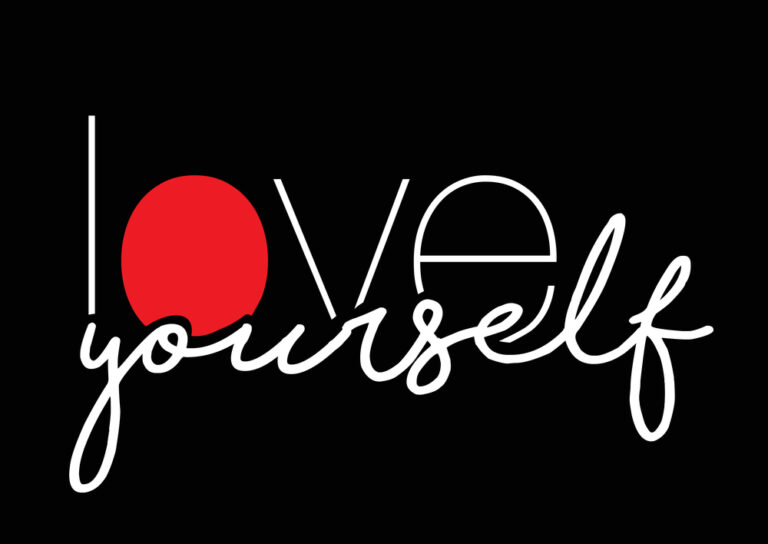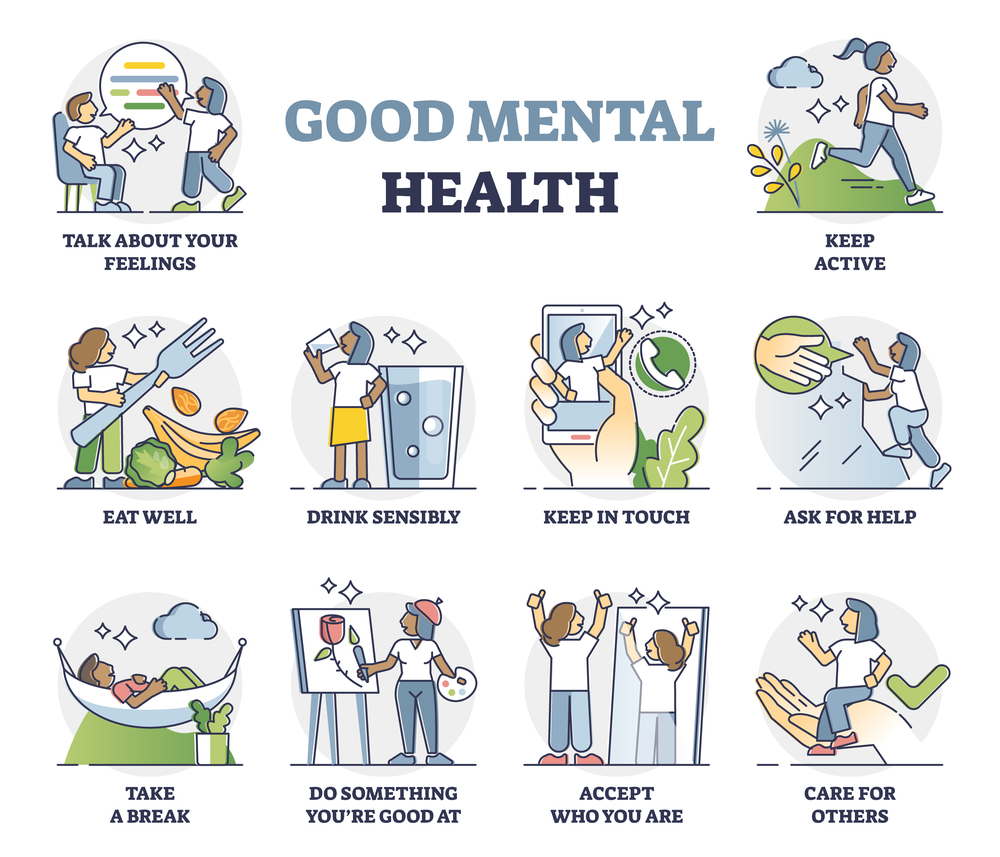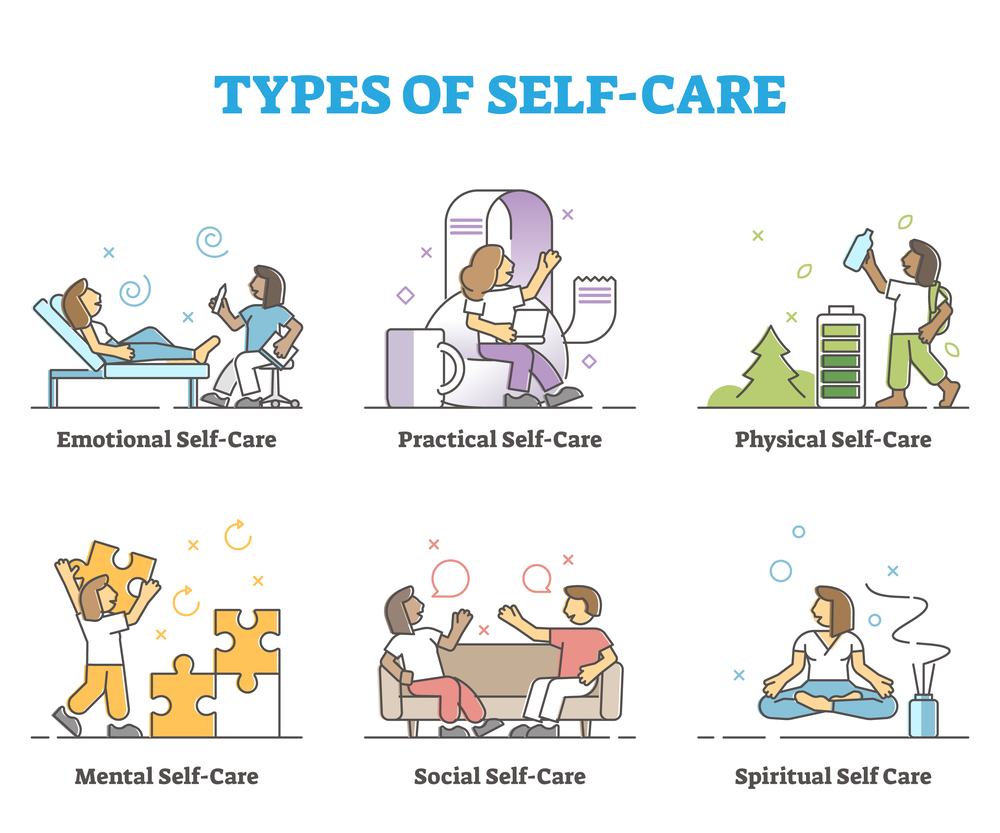How To Love Yourself: A Simple Guide For Self-Appreciation
 Loving yourself sounds simple, but it's a tough challenge for many. You might struggle with self-doubt and feel like you're never good enough. This is common, but it doesn't have to be your reality. Knowing how to appreciate yourself can change your life. An important fact to remember is that choosing tolerance, compassion, and radical […]
Loving yourself sounds simple, but it's a tough challenge for many. You might struggle with self-doubt and feel like you're never good enough. This is common, but it doesn't have to be your reality. Knowing how to appreciate yourself can change your life. An important fact to remember is that choosing tolerance, compassion, and radical […]Loving yourself sounds simple, but it's a tough challenge for many. You might struggle with self-doubt and feel like you're never good enough. This is common, but it doesn't have to be your reality.
Knowing how to appreciate yourself can change your life. An important fact to remember is that choosing tolerance, compassion, and radical acceptance for yourself plays a big part in self-appreciation.
This article will guide you through easy steps to love and appreciate yourself more every day. From building confidence to embracing your flaws and setting healthy boundaries – we've got you covered.
You'll learn practical tips to transform how you see yourself and improve your mental well-being. Ready to start? Let's go!
Understanding Self-Appreciation

Self-appreciation starts with recognizing your worth and celebrating the unique individual you are. It's about giving yourself credit for your accomplishments and forgiving yourself for mistakes, creating a foundation of self-love that supports mental health.
Definition Of Self-love
Self-love means embracing your whole self, recognizing both your strengths and weaknesses with a heart full of kindness. It involves giving yourself compassion, much like you would to a close friend, and understanding that making mistakes is part of being human.
This practice encourages you to set healthy boundaries for yourself, ensuring you're treated with respect by others and by your inner voice.
This journey also includes practicing self-care routines that nourish both your body and mind while actively working to replace negative thoughts with more positive affirmations about yourself.
As you learn to appreciate who you are in the present moment—flaws included—you build a stronger foundation for mental well-being and improved self-esteem.
Importance Of Self-love For Mental Health

Accepting yourself fully, including your flaws, is crucial to maintaining good mental health. This acceptance allows you to develop compassion and kindness toward yourself, setting a foundation for emotional well-being.
Acknowledging your worth and practicing self-care are pivotal steps in building resilience against life's challenges. These acts of self-love empower you to confront negative thoughts and replace them with positive affirmations that bolster your self-esteem.
Creating healthy boundaries is another key aspect of self-love that directly benefits mental health. It involves respecting and asserting your needs in relationships, which improves confidence and reduces stress.
Learning this skill helps you navigate personal interactions more effectively, ensuring you balance giving to others and caring for yourself. Through these practices of self-appreciation and care, you lay the groundwork for a happier, more fulfilled life.
Building Self-Confidence
Boosting your self-confidence starts by recognizing your worth and embracing your strengths. Every step you take can lead to greater self-esteem, setting the foundation for personal growth and fulfillment.
Tips For Improving Confidence And Self-esteem
Confidence and self-esteem are essential for personal growth, success, and overall well-being. However, many individuals struggle with low self-confidence and poor self-esteem, which can negatively impact various aspects of their lives.
Building self-confidence is a journey that requires self-awareness, effort, and a willingness to step out of one's comfort zone. In this context, several effective tips can help individuals improve their confidence and self-esteem.
One of the most crucial steps in building self-confidence is to practice self-acceptance. Acknowledging and embracing your strengths, weaknesses, and unique qualities without harsh self-judgment is essential.
Celebrate your accomplishments, no matter how small, and treat yourself with kindness and compassion. Focusing on positive self-talk and challenging negative thought patterns can significantly boost self-confidence and self-esteem.
Another effective tip is to engage in activities that challenge you and allow you to step out of your comfort zone. When you push yourself to try new things or overcome obstacles, you gain a sense of accomplishment and personal growth, which can greatly enhance your self-confidence.
This could include learning a new skill, taking up a hobby, or pursuing a goal that initially seemed daunting.
Additionally, surrounding yourself with a supportive network of family, friends, or a community that values and encourages you can significantly contribute to building self-confidence. Seek out positive relationships and environments that foster personal growth and celebrate your successes.
Conversely, it is essential to distance yourself from negative influences or toxic relationships that undermine your self-worth.
Finally, caring for your physical and mental well-being fosters self-confidence and self-esteem. Regular exercise, a balanced diet, and sufficient sleep can positively impact your mood, energy levels, and overall well-being.
Additionally, practicing mindfulness, meditation, or engaging in activities that bring you joy and relaxation can help cultivate a positive mindset and a healthier relationship with yourself.
Building self-confidence is an ongoing process, and being patient and persistent in your efforts is essential.
Practicing Self-Care

Self-worth is an essential component of overall well-being, and it is closely tied to the ability to set and maintain healthy boundaries.
Boundaries are the limits and rules we establish to protect our physical, emotional, and mental well-being.
In practicing self-care, setting healthy boundaries is crucial for promoting self-respect, asserting personal needs, and fostering healthy relationships. By learning to establish and enforce limits, individuals can cultivate a sense of self-worth and prioritize their own needs without compromising their values or integrity.
One of the first steps in setting healthy boundaries is to develop self-awareness. Take the time to identify your values, needs, and limits. Reflect on the situations or behaviors that make you feel uncomfortable, disrespected, or drained.
Once you clearly understand your boundaries, communicate them assertively and respectfully to others. Remember, setting boundaries is not about controlling others but taking responsibility for your well-being.
Learning to say "no" without feeling guilty or obligated is also important. Overcommitting or constantly putting others' needs before your own can lead to resentment, burnout, and a diminished sense of self-worth. Practice setting limits and declining requests or invitations that clash with your boundaries or personal values.
Remember, saying "no" is a form of self-care and self-respect.
Enforcing boundaries can be challenging, especially when dealing with individuals disregarding or violating them. In these situations, it is crucial to remain firm and consistent. Communicate the consequences of boundary violations clearly and follow through with them if necessary.
This may involve limiting contact, ending relationships, or seeking support from trusted individuals or professionals.
Ultimately, setting healthy boundaries is an ongoing process that requires patience, self-compassion, and the willingness to prioritize your well-being. It is important to remember that boundaries are not rigid walls but rather flexible guidelines that can evolve as your needs and circumstances change.
By practicing self-care and setting healthy boundaries, individuals can cultivate a strong sense of self-worth, foster healthy relationships, and live a more fulfilling and authentic life.
Overcoming Self-Doubt

Overcoming self-doubt starts with recognizing your worth and strengths. You can silence that inner critic by replacing negative thoughts with positive affirmations.
This is a cornerstone in the journey of self-improvement. It allows you to set healthier boundaries, question negative thoughts more effectively, and embrace your true value.
You unlock confidence and mental well-being that support personal growth and fulfillment by defeating self-doubt.
Choosing tolerance, compassion, and radical acceptance for yourself paves the way for profound self-love.
Embracing Self-Acceptance
Learning to embrace self-acceptance is a powerful step in your journey of personal growth. It means acknowledging your true self, with all its strengths and weaknesses, and choosing to love yourself regardless.
Daily Affirmations
Adopting daily affirmations can transform your self-perception and uplift your spirits. These powerful statements set the tone for positive thinking and strengthen your relationship with yourself.
- Start each day by affirming your worth. Say, "I am valuable and deserving of happiness and love." This reinforces your self-worth and boosts confidence.
- Tell yourself, "I am capable of overcoming challenges." This affirmation empowers you to face difficulties with a strong and hopeful mindset.
- Use the phrase, "I embrace my flaws as part of my uniqueness." Accepting all parts of yourself fosters self-compassion and reduces self-criticism.
- Practice saying, "I deserve time for self-care." This will remind you that looking after your well-being is not selfish but necessary.
- Affirm daily, "My feelings are valid and important." This encourages emotional acceptance and understanding, enhancing mental health.
- Keep telling yourself, "I am on a journey of growth and improvement." It helps you appreciate your progress without harsh judgments on speed or perfection.
- Say, "I release negative thoughts about myself." This affirmation removes self-doubt and promotes mental clarity and a healthier mindset.
- Use the affirmation, "I celebrate my strengths and successes." It motivates you to acknowledge your achievements, boosting self-esteem.
- Remind yourself, "I am open to love from myself and others." Opening your heart to love strengthens connections with yourself and those around you.
- Finally, tell yourself every morning: "Today is full of possibilities." Starting each day with optimism sets a positive outlook for whatever comes your way.
By repeating these affirmations daily, you actively shape a loving relationship with yourself that fuels personal growth, healing, and joy in every aspect of life.
Mindfulness And Self-awareness

Mindfulness and self-awareness play crucial roles in the journey towards self-acceptance. Self-acceptance involves:
- Embracing one's authentic self.
- Acknowledging both strengths and weaknesses.
- Cultivating a compassionate and non-judgmental attitude toward oneself.
Mindfulness, the practice of being fully present and attentive to the current moment, can help individuals develop a deeper understanding of themselves, their thoughts, emotions, and behaviors.
By fostering self-awareness, individuals can gain invaluable insights into their inner selves, enabling them to embark on a path of self-acceptance and personal growth.
Mindfulness encourages individuals to observe their thoughts and emotions without judgment or attachment. Through mindful awareness, individuals can recognize patterns of self-criticism, negative self-talk, or unhelpful beliefs that may hinder self-acceptance.
By simply observing these thoughts and emotions without engaging or identifying with them, individuals can create a sense of detachment and objectivity, allowing them to respond with greater compassion and understanding towards themselves.
Moreover, mindfulness cultivates a heightened awareness of sensations, emotions, and experiences in the present moment. This increased self-awareness can help individuals recognize and appreciate their unique qualities, strengths, and capabilities.
By focusing on the present rather than dwelling on past regrets or future worries, individuals can develop a deeper appreciation for who they are in the here and now, fostering a sense of self-acceptance and self-compassion.
Self-awareness also involves recognizing and acknowledging one's values, beliefs, and motivations. Through mindful introspection, individuals can understand what truly matters to them, what brings them fulfillment, and what aligns with their authentic selves.
This self-knowledge can serve as a robust foundation for self-acceptance, enabling individuals to make choices and live in a way that honors their true selves rather than conforming to external pressures or societal expectations.
Embracing self-acceptance is a continuous process that requires patience, commitment, and consistent practice of mindfulness and self-awareness. It involves cultivating a non-judgmental stance towards oneself, celebrating individual uniqueness, and recognizing that personal growth and self-acceptance are lifelong journeys.
By integrating mindfulness practices into daily life and fostering self-awareness, individuals can develop a deeper understanding and appreciation for themselves, ultimately leading to a greater sense of self-acceptance and overall well-being.
Self-care And Self-expression
Self-care and self-expression play a vital role in the pursuit of embracing self-acceptance.
Self-acceptance is a journey of understanding, appreciating, and embracing one's authentic self, including both strengths and weaknesses. It involves cultivating a compassionate and non-judgmental attitude towards oneself and recognizing that personal growth is continuous.
Self-care and self-expression are powerful tools that facilitate this journey, enabling individuals to nurture their physical, emotional, and mental well-being while honoring their unique identities.
Self-care encompasses many activities and practices that prioritize one's overall well-being. It involves taking intentional steps to meet one's physical, emotional, and mental needs. This can include engaging in activities promoting relaxation and stress relief, such as exercise, meditation, or leisure time in nature.
It can also involve setting boundaries, practicing self-compassion, and seeking support when needed. By prioritizing self-care, individuals demonstrate self-respect and self-worth, essential to self-acceptance.
Conversely, self-expression allows individuals to explore and celebrate their unique identities, talents, and perspectives. It can take many forms, such as creative pursuits like writing, painting, or music, or simply expressing one's thoughts and feelings through open and honest communication.
Self-expression allows individuals to authentically share their experiences, emotions, and perspectives with the world, fostering a deeper connection with themselves and others.
When individuals engage in self-care and self-expression, they actively nurture their mental, emotional, and creative well-being. This, in turn, can cultivate a greater sense of self-awareness and self-acceptance.
By taking the time to understand and embrace their unique needs, strengths, and vulnerabilities, individuals can develop a more profound appreciation for their authenticity. Additionally, self-expression allows individuals to share their authentic selves with the world, building confidence and self-esteem.
Embracing self-acceptance is a lifelong journey that requires ongoing commitment and effort. Self-care and self-expression provide powerful tools to support this journey by promoting self-awareness, self-compassion, and self-worth.
As individuals prioritize self-care and engage in self-expression, they cultivate a deeper understanding and appreciation of their unique identities, strengths, and vulnerabilities. This, in turn, fosters a greater sense of self-acceptance, enabling individuals to live more authentic and fulfilling lives.
Self-care and self-expression are essential components of embracing self-acceptance, nurturing personal growth, and fostering a healthy, positive relationship with oneself.
Cultivating Self-Compassion
Cultivating self-compassion means acknowledging your flaws and accepting yourself as you are, which is crucial for a fulfilling life. It involves being kind to yourself, especially during tough times or when you notice negative thoughts creeping in.
Start by treating yourself with the same care and understanding that you would offer a good friend. This simple act can profoundly impact your mental well-being, increasing self-esteem and happiness.
Self-compassion is about giving ourselves the same kindness and care we'd give to a good friend.
Practicing mindfulness allows you to become more aware of your thoughts and feelings without harsh judgment. Replace critical thoughts with supportive ones, focusing on personal growth rather than perfection.
Self-love and self-appreciation are noble pursuits that contribute to well-being and personal growth. However, self-criticism, negative self-talk, and unrealistic expectations often hinder the path to truly loving oneself.
In this context, cultivating self-compassion is a powerful tool to counteract these destructive tendencies and foster a more positive, nurturing relationship with oneself. Self-compassion involves treating oneself with kindness, understanding, and empathy, particularly during moments of struggle or personal shortcomings.
One of the fundamental aspects of self-compassion is recognizing our shared human experience. It is essential to understand that imperfection, failure, and suffering are inherent parts of the human condition and that we all experience moments of difficulty and self-doubt.
By acknowledging this universal truth, we can learn to respond to our struggles with greater kindness and understanding rather than harsh self-judgment or criticism.
Practicing mindfulness is another key component of cultivating self-compassion. Mindfulness encourages us to observe our thoughts and emotions with a non-judgmental, curious attitude, rather than becoming overwhelmed or consumed by them.
When we approach our experiences with mindful awareness, we create space for self-compassion to arise. We can acknowledge our pain or shortcomings without identifying with them, and respond with compassionate self-talk and a commitment to personal growth.
Self-compassion also involves actively nurturing and caring for oneself, both physically and emotionally. This can manifest in various forms, such as engaging in self-care activities like exercise, healthy eating, or hobbies that bring joy and fulfillment.
It can also involve setting boundaries, seeking needed support, and consciously prioritizing one's well-being over external pressures or societal expectations.
Ultimately, cultivating self-compassion is an ongoing practice that requires patience, commitment, and a willingness to challenge deeply ingrained patterns of self-criticism and negative self-talk. It is a journey of self-acceptance, self-kindness, and self-care that can profoundly impact our ability to love and appreciate ourselves.
As we embrace self-compassion, we develop a more resilient, nurturing, and compassionate relationship with ourselves, enabling us to navigate life's challenges with greater ease, self-confidence, and overall well-being.
This shift improves your relationship with yourself and enhances your overall quality of life by fostering positive attitudes and resilience against stress.
Celebrating Self-Achievements
Celebrating your achievements, big or small, reinforces the fact that you deserve self-love and appreciation. Take time to acknowledge your development progress, whether mastering a new skill or simply sticking to a healthy habit.
This act of recognition fuels your motivation and boosts your self-esteem. Share these victories with friends or jot them down in a journal as a reminder of your capabilities and strength.
Recognizing every success paves the way for nurturing self-growth. It sets a foundation for continuous improvement and encourages you to set new goals.
Nurturing Self-Growth
Focusing on self-growth involves setting personal goals and challenging yourself to step out of your comfort zone. This means accepting where you are now and planning where you want to be.
It's about acknowledging your strengths and weaknesses with radical acceptance and working daily to enhance your skills, knowledge, and emotional well-being. Self-growth is an ongoing process that requires patience, resilience, and a willingness to learn from both success and failure.
Taking steps toward personal development also encourages a deeper sense of self-awareness. You become more tuned in to your emotions, thoughts, and actions. This heightened awareness leads to better decision-making and strengthens relationships with others as you understand yourself more deeply.
Quick Steps to Self-Appreciation
Here’s a concise, actionable guide to loving and appreciating yourself more every day:
- Start with Self-Awareness: Begin by identifying your strengths and acknowledging your weaknesses. This honest assessment is the foundation of self-appreciation.
- Practice Positive Self-Talk: Shift your inner dialogue to be more encouraging and supportive. Replace critical thoughts with affirmations like, "I am capable and worthy."
- Set Achievable Goals: Establish clear, realistic goals that motivate you and celebrate each achievement, regardless of size.
- Embrace Your Flaws: Understand that perfection is unattainable and that your quirks and imperfections make you unique.
- Cultivate Self-Compassion: Treat yourself with the kindness and understanding you would offer a friend.
- Prioritize Self-Care: Regularly engage in activities that nourish your body, mind, and soul—whether reading, yoga, or nature.
- Establish Healthy Boundaries: Learn to say no and set limits to protect your energy and well-being.
- Seek Support When Needed: Don’t hesitate to ask for help or seek professional guidance to navigate your feelings and challenges.
- Reflect Regularly: Take time to reflect on your journey, acknowledging growth and areas for improvement.
Incorporating these steps into your daily routine can strengthen your self-love and lead a more fulfilling life.
Conclusion
Keep pushing forward on this journey towards embracing who you are while striving for the person you wish to become.
Loving yourself is an essential journey, not a destination. Every small step you take towards self-appreciation adds up to significant changes in how you see and treat yourself. Think of it as planting seeds for a garden where your self-worth can bloom brightly.
You create a nurturing environment for personal growth through consistent self-care, challenging negative thoughts, and embracing every part of yourself. Your efforts in practicing kindness and compassion towards yourself pave the way for a life filled with more happiness, fulfillment, and profound peace.

